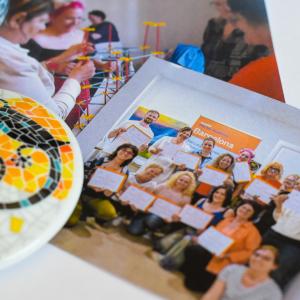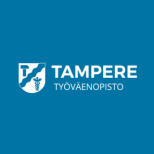The Acceleration Line to a Sustainable Everyday Life project's (Kiihdytyskaista kestävään arkeen) training was initially designed for both immigrants and native Finnish speakers. Although many native Finns also need to strengthen their basic everyday skills and job-seeking abilities, the courses mainly attracted immigrants due to the emphasis on the Finnish language.
The training days included not only Finnish language lessons but also mathematics, study and job-seeking skills, handicrafts, discovering one's strengths, digital skills, and visits to city sites.
– Although there were separate lessons for the Finnish language, it was important that language learning was integrated into all subjects, making it particularly effective. Participants found it useful to learn Finnish from many different teachers, as we all have our own way of speaking, explains project planner Kati Mykkänen.
At the right time
The Acceleration Line to a Sustainable Everyday Life project organized seven training sessions from August 2023 to December 2024. Each training session lasted seven weeks, with group members studying five days a week for a total of 20 hours. In total, 1200 hours of training were offered, taught by seven teachers.
Each group could accommodate 16 people, and at its peak, nearly 50 applicants were left on the waiting list. Mykkänen believes the popularity was due to the fact that intensive courses are not offered for free.
– People have a strong desire to move forward in their lives, and many want to develop themselves outside the home.
Finding clients for project training is not always easy, but the Acceleration Line to a Sustainable Everyday Life succeeded with timely marketing. Before the training began, Mykkänen and the project team visited multicultural women's meeting place Naistari and were in contact with the multilingual advisory service Mainio and International House, allowing counselors to inform their clients about the training.
In the end, there were so many applicants that participants had to be selected by lottery. Participants also recommended the training to their acquaintances, so people outside of guidance services also applied to the Acceleration Line groups.
More guidance and cultural discussions
Each group filled out a feedback survey during their final meeting. The feedback was almost exclusively positive, and few wanted to change anything.
– The teachers and the atmosphere received praise. Many liked the training so much that they wished it had been longer or that they could participate again, Mykkänen says.
Despite the positive feedback, the Adult Education Centre developed the training during the project. Ideas emerged in teachers' meetings and group discussions, steering group meetings, and with colleagues.
– It was great that some groups were proactive and asked to come to the classroom to hear development ideas, Mykkänen says.
During the project, the application process was changed to a lottery to avoid a speed competition, as applicants' digital skills varied significantly. The lottery ensured equal access to training.
In future, similar projects, Mykkänen would strengthen guidance to ensure that even the quietest participants receive enough support. Additionally, more precise verification of language skills would be important to ensure the smooth functioning of the groups.
The language proficiency requirement for the Fast Track to Sustainable Everyday Life project training was A1.3, but in practice, applicants' skills could be either weaker or more advanced.
– Giving even more space for free conversation would also be important, as it is an excellent way to get to know Finnish culture, Mykkänen says.
Meaning in life
Many participants in the Acceleration Line to a Sustainable Everyday Life training found a path forward. Mykkänen supported them in finding a meaningful place. The paths led to preparatory education for qualifications (TUVA), vocational schools, internships, and participating in the Adult Education Centre's liberal adult education courses.
Some were directed to employment services, as not everyone was aware of this possibility.
– It is, of course, difficult to say what is due to the training, what is due to the OMA coach, and what is solely due to the individual. However, the training was a good activator that strengthened participants' belief in their own abilities, increased their courage and motivation to move forward, and encouraged them to study the language independently as well.
Next, the Adult Education Centre aims to utilize the successful model of the Acceleration Line to a Sustainable Everyday Life project in a new project, the funding decision for which is still pending at the time of publication.
– The need for training is great. Each of us wants meaning in our lives. For some, the experience of being a student is extremely important, not to mention the social interaction, Mykkänen says.
The Acceleration Line to a Sustainable Everyday Life project was funded by a special grant from the Ministry of Education and Culture until March 31, 2025, intended to strengthen basic skills for adults and provide language training for immigrants who have exceeded the integration period.





Leave a comment